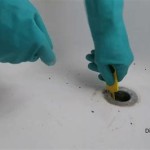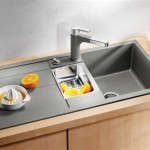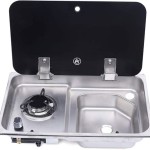Best Cleaners for Bathroom Sinks: A Comprehensive Guide
Maintaining a clean bathroom sink is crucial for hygiene and aesthetics. A grimy sink can harbor bacteria and detract from the overall appearance of a bathroom. Selecting the optimal cleaner requires careful consideration of the sink material, the type of stain or buildup present, and the desired level of cleaning power versus gentleness. This article explores various cleaner types suitable for bathroom sinks, detailing their benefits, drawbacks, and appropriate applications.
The market offers a spectrum of cleaning products, ranging from commercially manufactured formulas to natural and homemade solutions. Each option possesses distinct characteristics that make it more or less suitable for different cleaning scenarios. Therefore, understanding the properties of these cleaners is essential for making informed decisions and achieving consistent cleaning results without damaging the sink surface.
Understanding Common Bathroom Sink Stains and Buildup
Before selecting a cleaner, it is important to identify the types of stains and buildup commonly found in bathroom sinks. These can include:
- Soap Scum: A residue formed from the reaction of soap with hard water minerals. It appears as a dull, white film and clings tightly to surfaces.
- Hard Water Stains: Mineral deposits, primarily calcium and magnesium, left behind after water evaporates. These stains often appear as white or cloudy spots.
- Rust Stains: Caused by iron in the water supply or from metal objects left in the sink. Rust stains appear reddish-brown and can be difficult to remove.
- Mold and Mildew: Thrive in damp environments and appear as black, green, or gray patches. They can cause stains and pose health risks.
- Toothpaste Splatter: Though seemingly minor, dried toothpaste can leave a chalky residue, especially if left uncleaned for extended periods.
- Hair and Debris: Accumulation of hair, shaving cream, and other debris can clog drains and contribute to unpleasant odors.
The nature of the stain dictates the type of cleaner and cleaning method required for effective removal. A gentle cleaner may suffice for fresh soap scum, while a stronger solution may be needed for stubborn hard water stains or rust.
Types of Bathroom Sink Cleaners
A diverse array of cleaning products is available for bathroom sinks, each with its own set of advantages and disadvantages. These can be broadly categorized into commercial cleaners and natural/homemade cleaners.
Commercial Cleaners: These are specifically formulated for cleaning bathroom surfaces and often contain a blend of detergents, solvents, and disinfectants.
- All-Purpose Cleaners: Designed for general cleaning and can be effective on light soap scum and grime. They are typically available as sprays or liquids.
- Bathroom Cleaners: Formulated specifically for bathroom surfaces and often contain ingredients to dissolve soap scum, hard water stains, and mildew. Some contain bleach for disinfection.
- Acidic Cleaners: Contain acids like hydrochloric acid or phosphoric acid. They are effective at removing hard water stains and rust but can damage certain sink materials like marble or enamel.
- Abrasive Cleaners: Contain abrasive particles like silica or calcium carbonate. They are effective at scrubbing away stubborn stains but can scratch delicate surfaces if used improperly.
- Cream Cleaners: Contain a mild abrasive suspended in a creamy base. They are gentler than scouring powders but still provide some scrubbing power.
Natural/Homemade Cleaners: These solutions utilize readily available ingredients and are often considered more environmentally friendly and less harsh than commercial cleaners.
- Baking Soda: A mild abrasive and deodorizer. It can be used to scrub away soap scum and stains.
- Vinegar: An acidic solution that can dissolve hard water stains and soap scum. White vinegar is typically used for cleaning.
- Lemon Juice: Similar to vinegar, lemon juice contains citric acid, which can help dissolve stains and leave a fresh scent.
- Borax: A natural mineral with cleaning and disinfecting properties. It can be used to remove mold and mildew.
- Hydrogen Peroxide: A mild bleaching agent that can disinfect and remove stains.
- Essential Oils: Some essential oils, like tea tree oil and lavender oil, have antimicrobial properties and can be added to cleaning solutions for extra disinfecting power and fragrance.
Choosing the Right Cleaner for Specific Sink Materials
The material of the bathroom sink is a critical factor in selecting the appropriate cleaner. Certain cleaners can damage or discolor specific materials. Common sink materials include:
- Porcelain: A durable and non-porous material that is resistant to most cleaners. However, abrasive cleaners can scratch the surface, dulling its shine over time.
- Ceramic: Similar to porcelain, ceramic is also durable and resistant to most cleaners. Like porcelain, avoid abrasive cleaners.
- Stainless Steel: A popular choice for its durability and modern appearance. Avoid abrasive cleaners, bleach, and harsh chemicals, as these can scratch or discolor the surface. Opt for stainless steel cleaners specifically designed for this material.
- Glass: A delicate material that is prone to scratching. Avoid abrasive cleaners and harsh chemicals. Use glass cleaners or mild detergents.
- Stone (Marble, Granite): Porous materials that can be stained or damaged by acidic cleaners like vinegar and lemon juice. Use pH-neutral cleaners specifically designed for stone surfaces.
- Acrylic: A lightweight and affordable material that is susceptible to scratching and damage from harsh chemicals. Use mild detergents and avoid abrasive cleaners.
- Enamel: A coating applied to cast iron or steel. It is susceptible to chipping and scratching. Avoid abrasive cleaners and strong acids.
Always consult the manufacturer's recommendations for cleaning specific sink materials. Testing a cleaner in an inconspicuous area before applying it to the entire sink is also advisable.
Effective Cleaning Techniques
Regardless of the chosen cleaner, proper cleaning techniques are essential for achieving optimal results and preventing damage to the sink. Consider the following tips:
- Pre-Cleaning: Remove any loose debris, such as hair and soap scum, from the sink before applying the cleaner. This will allow the cleaner to work more effectively.
- Application: Apply the cleaner to the sink surface according to the manufacturer's instructions. For spray cleaners, use a generous amount and allow it to dwell for the recommended time. For liquid cleaners, apply with a sponge or cloth.
- Scrubbing: Use a non-abrasive sponge, cloth, or brush to scrub the sink surface. Apply gentle pressure and avoid excessive force, especially on delicate materials. For stubborn stains, use a specialized scrub brush or sponge designed for bathroom cleaning.
- Rinsing: Rinse the sink thoroughly with clean water to remove all traces of the cleaner. Ensure that no residue remains, as this can attract dirt and grime.
- Drying: Dry the sink with a clean towel to prevent water spots and soap scum buildup. Polishing the sink with a dry microfiber cloth can enhance its shine.
- Ventilation: Ensure adequate ventilation while cleaning, especially when using strong chemical cleaners. Open windows or turn on the exhaust fan to avoid inhaling fumes.
- Safety Precautions: Wear gloves to protect your hands from harsh chemicals. Avoid mixing different cleaning products, as this can create dangerous fumes.
Specific Cleaner Recommendations for Common Stains
Addressing specific stains requires tailored cleaning approaches. Here are some recommendations:
Soap Scum:
- Commercial: Bathroom cleaners specifically formulated for soap scum removal.
- Natural: A paste of baking soda and water, or a solution of vinegar and water.
Hard Water Stains:
- Commercial: Acidic cleaners (use with caution and only on resistant materials).
- Natural: Vinegar or lemon juice applied directly to the stain and allowed to dwell.
Rust Stains:
- Commercial: Rust removal products specifically designed for bathroom surfaces.
- Natural: A paste of baking soda, cream of tartar, and hydrogen peroxide.
Mold and Mildew:
- Commercial: Bathroom cleaners containing bleach or mold and mildew removers.
- Natural: A mixture of bleach and water (1 part bleach to 10 parts water) or borax and water.
Stubborn Stains:
- Commercial: Cream cleaners or mild abrasive cleaners (use with caution).
- Natural: A paste of baking soda and a few drops of hydrogen peroxide.
Always test any cleaner in an inconspicuous area before applying it to the entire sink, particularly when dealing with stain removal. Follow manufacturer's instructions carefully for safe and effective use.
Tips for Preventing Bathroom Sink Buildup
Preventing buildup is more efficient than constantly battling stubborn stains. Consider adopting these preventative measures:
- Wipe Down: Wipe down the sink after each use to remove water droplets and prevent soap scum and hard water stains from forming.
- Ventilation: Ensure proper ventilation in the bathroom to reduce moisture levels and prevent mold and mildew growth.
- Water Softener: Consider installing a water softener to reduce the mineral content of your water supply, thereby minimizing hard water stains.
- Clean Regularly: Establish a regular cleaning schedule to prevent buildup from accumulating. A quick weekly cleaning can prevent the need for more intensive cleaning later on.
- Use Liquid Soap: Liquid soap tends to create less soap scum than bar soap.
- Dry Surfaces: Dry the sink and surrounding surfaces after each use, especially around faucets and drains, to prevent water spots and mineral deposits.
By implementing these preventative measures, one reduces the frequency and intensity of cleaning required, thereby extending the lifespan and maintaining the appearance of the bathroom sink.

Best Bathroom Cleaner For Sparkly Clean Showers And Sinks Madeformums

10 Best Shower Cleaners Of 2025 Reviewed

Best Bathroom Cleaning S Oxo Uk

How To Clean A Bathtub And Sink Reviews By Wirecutter

21 Amazing Bathroom Cleaning Tips
These 5 Household Cleaning S Are Miracle Workers For Bathrooms And Kitchens Trust Me I Use Them All

How To Clean Your Bathroom Sink Cleaning Services Denver Co

Revealed The Best Bathroom Cleaning S Otago Daily Times News

The Best Way To Clean Your Bathroom Sink

9 Best Stainless Steel Cleaners Of 2024 Tested By Experts







